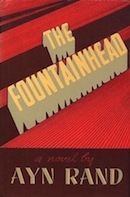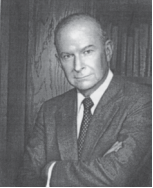Thomas A. Roe
Thomas Anderson Roe, Jr. (1927-2000) was a businessman and industrialist from Greenville, South Carolina.[1] He was the founding chairman of the State Policy Network (SPN) as well as founder of the South Carolina Policy Council. In the mid-1980s, Roe allegedly told fellow wealthy conservative donor and Heritage Foundation trustee Robert Krieble, "You capture the Soviet Union -- I'm going to capture the states."[2] He was an adviser to President Ronald Reagan[3] and was called "an architect of the South Carolina Republican Party."[4] He died in 2000, but his Roe Foundation "continues to provide financial support to free-market policy groups across the country."[5] This article is a breakout of the State Policy Network article. Please see State Policy Network for more.
Roe "accumulated his wealth as chairman of the board of Builder Marts of America Inc., which he transformed from a small building-materials supply company into an international corporation," according to The Greenville News.[4] (The company had sales of $600 million in 1998.)[6]
Contents
No "Collectivist World" or Organized Musicians: Strict Instructions for Endowment at Roe Foundation

According to the conservative "opposition research" think tank Capital Research Center (CRC), Roe believed in maintaining "donor intent," so the foundation his personal wealth endowed, the Roe Foundation, has explicit by-laws and requires grantees to "sign a document promising to uphold" the following principles:[7]
- "First, 'the maximum potential of a free people is achieved when they are free to control their own destiny'; second, 'the greatest threat to these freedoms is intrusive government'; and third, 'the Judeo-Christian tradition represents the underpinnings of a just society.' Furthermore, recipients of the foundation’s support must recognize 'the importance of state and local organizations functioning alongside national organizations in the pursuit of a free society.' Finally, they must 'educate the public at large and all public policy makers to a better understanding of these fundamental values and practical ways to achieve the goals of expanding human freedom.'"[7]
A few grants can go to "nonprofit organizations in the metropolitan area of Greenville until such time as there are no descendents [sic] of Tom or Shirley Roe living there, but one such grant, to the Greenville Symphony Orchestra, "stipulates that its musicians cannot unionize. 'Tom didn’t like unions,' says [his widow] Shirley Roe."[7]
Roe gave the Mont Pelerin Society and Philadelphia Society "standing to sue" the Roe Foundation if, after his death, the Roe Foundation makes a grant to an organization “whose activities or public statements reflect a belief in a collectivist world or any view inconsistent” with the foundation’s announced principles (emphasis added), according to Chicago lawyer Paul Rhoads, who has written for the Philanthropy Roundtable.[7]
Political Influence
According to CRC, Roe was vice chairman and finance chairman of the Republican Party in South Carolina and a member of the Republican National Finance Committee. He was a delegate to the 1964 Republican National Convention, where he "enthusiastically supported the doomed candidacy of Barry Goldwater."[7]
But according to Ed McMullen, president of the South Carolina Policy Council, "He became frustrated with going to meetings of Republicans and discovering that nobody else in the room had even heard of economists such as Ludwig von Mises or Friedrich Hayek." And, according to SPN's founding executive director, Byron Lamm, "He was also concerned that a lot of Republicans were country-club types who weren’t really committed to free-market ideas." As John J. Miller summarizes in his CRC article about Roe, "Too many of them simply hadn’t read their Hayek."[7]
So he turned to conservative policy foundations and was an early funder of the Heritage Foundation, joining Joseph Coors, Samuel Roberts Noble, and Richard Mellon Scaife. He led Heritage's finance committee.[7]
Early Life and Business Career
According to CRC, Roe grew up on his family's farm. He attended Furman University near Greenville, graduating in 1948. The school later gave him an honorary law degree in 1980. He did cancer research as an undergraduate there. In 1961, his father died and he inherited his business, Citizens Lumber Company.[7]
In order for his and other family-owned building materials dealerships to be able to compete with chain stores, he created "Builder Marts of America" to supply "a variety of services to independent dealers, including advertising, security, accounting, and training." Meanwhile, a subsidiary, Builder Way, "moved to acquire" businesses that became available "when a client of Builder Marts would retire or die."[7]
He also started a long-distance phone service to take advantage of the telephone industry deregulation. It was eventually taken over by MCI.[7]
Builder Marts became a "Forbes 500" international company by 2000.[7]
Articles and Resources
Related SourceWatch Articles
- State Policy Network:
- American Legislative Exchange Council (ALEC)
- DonorsTrust
- Donors Capital Fund
- Koch Family Foundations
- Koch Industries
- Franklin Center for Government and Public Integrity
- Heritage Foundation
- Think tanks
- Whitney Ball
- Adam Meyerson
- Bridgett Wagner
Related PRWatch Articles
- Brendan Fischer, Why Are the Franklin Center's "Wisconsin Reporter" and "Watchdog.org" Attacking the John Doe?, PRWatch.org, December 19, 2013.
- Rebekah Wilce, The State Policy Network's Cozy Relationship with Big Tobacco, PRWatch.org, December 16, 2013.
- Rebekah Wilce, Did ALEC Found SPN? 1991 Report Suggests So, Exposes SPN Agenda, PRWatch.org, December 12, 2013.
- Rebekah Wilce, Guardian Documents Expose State Policy Network Groups' Intent to Lobby, PRWatch.org, December 5, 2013.
- Rebekah Wilce, State Policy Network: The Stealth Network Dramatically Influencing State Law, PRWatch.org, December 5, 2013.
- Rebekah Wilce, Tracie Sharp: Bursar of Mystery Money and "IKEA Model" Materials to Stink Tanks, PRWatch.org, November 19, 2013.
- Center for Media and Democracy, Reports Expose Extreme Pressure Groups Masquerading as Think Tanks, press release, November 13, 2013.
- Rebekah Wilce, A Reporters’ Guide to the "State Policy Network": the Right-Wing Think Tanks Spinning Disinformation and Pushing the ALEC Agenda in the States, PRWatch.org, April 4, 2013.
- Sara Jerving, ALEC and Heartland Aim to Crush Renewable Energy Standards in the States, PRWatch.org, November 27, 2012.
- Connor Gibson, Meet the Network Hiding the Koch Money: "Donors Trust" and "Donors Capital Fund", PRWatch.org, October 29, 2012.
- Brendan Fischer, Koch-Funded Mackinac Center Brings Wisconsin Act 10 Provisions to ALEC, PRWatch.org, May 2, 2012.
- Sara Jerving, Franklin Center: Right-Wing Funds State News Source, PRWatch.org, October 31, 2011.
External Articles and Resources
- Wall Street Journal, The Spoils of the Republican State Conquest, December 9, 2016, archived by CMD here.
- DeSmog Blog, Stink Tanks: Historical Records Reveal State Policy Network Was Created by ALEC, December 9, 2013.
- The Guardian, State conservative groups plan US-wide assault on education, health and tax, December 5, 2013.
- Portland Press Herald, "Washington County residents have mixed reactions to plan to eliminate taxes," December 5, 2013.
- The Texas Observer, "The Money Behind the Fight to Undermine Medicaid," December 5, 2013.
- Media Matters, North Carolina Newspapers Largely Ignore Conservative Funding Of Sham Think Tanks, December 3, 2013.
- Shepherd Express, Masters of Manipulation: Right-wing Billionaires, Corporations and the Bradley Foundation Pay for Junk Studies that Prop up Their Agenda, November 27, 2013.
- "Moyers & Company," How a Shadowy Network of Corporate Front Groups Distorts the Marketplace of Ideas, November 19, 2013.
- MSNBC "Rachel Maddow Show," November 18, 2013.
- Free Speech TV "Ring of Fire," Facebook, Microsoft, AT&T and Others Supporting Right Wing Propaganda Machine, November 18, 2013.
- Topeka Capital-Journal, Trabert dismisses report tying KPI to Koch agenda, November 16, 2013.
- The New Yorker (Jane Mayer), Is IKEA the New Model for the Conservative Movement?, November 15, 2013.
- Salon, Ted Cruz and Koch brothers embroiled in shadowy Tea Party scheme, November 15, 2013.
- St. Louis Business Journal, Beyond Sinquefield: Who else is funding the Show-Me Institute?, November 15, 2013.
- The Guardian, Facebook and Microsoft help fund rightwing lobby network, report finds, November 14, 2013.
- Huffington Post, Meet The Little-Known Network Pushing Ideas For Kochs, ALEC, November 14, 2013.
- CBS St. Louis, Show-Me Institute’s Ties Questioned in New Report, November 14, 2013.
- Talking Points Memo, Florida Conservative Group Helping Muck Up Obamacare In Alaska, November 14, 2013.
- Mint Press News, Reports Reveal SPN’s Secret Corporate Agenda Through Use ‘Expert’ Testimony, November 14, 2013.
- Media Matters, Shadowy Right-Wing Group Generates Media Coverage For Conservative Policy From Coast To Coast, November 14, 2013.
- The Institute for Southern Studies, Are conservative think tanks breaking lobbying laws?, November 14, 2013.
- Nonprofit Quarterly, Corporate Money in Network of Right-Wing State Policy Think Tanks, November 14, 2013.
- The Progressive, Right-Wing Think Tanks Push Privatization in the States, November 13, 2013.
- Politico, Report: Think tanks tied to Kochs, November 13, 2013.
- Lawrence Journal-World, Reports released by progressive groups are critical of Kansas Policy Institute, November 13, 2013.
- Maine Insights, Report: Maine Heritage Policy Center’s funding connection to Koch Brothers, November 13, 2013.
- The Florida Current, Liberal groups bemoan lobbying by conservative think tanks, November 13, 2013.
- The Oregonian, Cascade Policy Institute benefits from secretive donor group but says it operates independently, November 13, 2013.
- Center for Media and Democracy, EXPOSED: The State Policy Network, The Powerful Right-Wing Network Helping to Hijack State Politics and Government, organizational report, November 13, 2013.
- Arizona Working Families and CMD, A Reporter’s Guide to the Goldwater Institute: What Citizens, Policymakers, and Reporters Should Know, organizational report, updated November 13, 2013.
- Progress Florida and CMD, Lawmaking Under the Influence of Very Special Interests: Understand the role of Florida ‘think tanks’ in driving a Koch-fueled, ALEC-allied corporate agenda, organizational report, November 13, 2013.
- Maine's Majority Education Fund, Fooling Maine: How national conservative groups infiltrated Maine politics by founding and funding the Maine Heritage Policy Center, organizational report, November 13, 2013.
- Progress Michigan, Who's Running Michigan? The Far-Right Influence of the Mackinac Center for Public Policy, organizational report, November 13, 2013.
- Alliance for a Better Minnesota, Who's in Charge: How Nationalized Corporate-Run Think Tanks Influence Minnesota Politics, organizational report, November 13, 2013.
- Progress Missouri, What Missourians Need to Know About the Show-Me Institute, organizational report, updated November 13, 2013.
- Granite State Progress, Bad Bartlett: The Josiah Bartlett Center and NH Watchdog Answer the Call of the Koch Brothers, organizational report, November 13, 2013.
- ProgressOhio, Smoke Screen: The Buckeye Institute, organizational report, November 13, 2013.
- Keystone Progress, Think tanks or corporate lobbyist propaganda mills?, organizational report, November 13, 2013.
- Progress Texas, TPPF + ALEC, organizational report, November 13, 2013.
- One Wisconsin Now, S is for Shill: Inside the Bradley Foundation's Attack on Public Education, organizational report, November 13, 2013.
- Muncie Voice, Pence and Right-Wing Are Taking Over Public Education, November 13, 2013.
- The Spokesman-Review, Shawn Vestal: Idaho Freedom Foundation pushes limits of word ‘charity’, November 2, 2013.
- AZ Central, When this ‘watchdog’ pitches, taxpayers strike out, October 12, 2013.
- IndyStar, Daniels says speech to partisan group was a mistake, October 10, 2013.
- Muncie Voice, Indiana Policy Review: Not an Independent News Source, October 2, 2013.
- The Spokesman-Review, Idaho Freedom Foundation's charitable status scrutinized, September 15, 2013.
- CounterSpin, Lee Fang on 'The Right Leans In', April 5, 2013.
- FireDogLake, State Policy Network, an umbrella coordinating ALEC, Heritage, Heartland and others, April 4, 2013.
- Thom Hartmann with Lee Fang on MSNBC, The conservative State Policy Network is sneaking into your state & will change America, March 29, 2013.
- Current TV "War Room", Lee Fang discussing the State Policy Network, March 28, 2013.
- The Nation, The Right Leans In, March 26, 2013.
- Democracy Now, Donors Trust: Little-Known Group Helps Wealthy Backers Fund Right-Wing Agenda in Secret, February 19, 2013.
- Paul Abowd, Center for Public Integrity, Donors use charity to push free-market policies in states, Consider the Source, February 14, 2013.
- John R. Mashey, Fake science, fakexperts, funny finances, free of tax 2, DeSmog Blog report, updated October 23, 2012, p. 74.
- Urban Milwaukee, Stealth Conservatives, October 11, 2012.
- Rome News-Tribune, ANALYSIS: Georgia leaders depend on the same well for ideas, October 2012.
- Andy Kroll, The Right-Wing Network Behind the War on Unions, Mother Jones, April 25, 2011.
- Guidestar, State Policy Network, IRS filings and other organizational information about SPN.
- Center for Policy Alternatives, ALEC and the Extreme Right-Wing Agenda, organizational brochure about ALEC and SPN.
- John J. Miller, Fifty Flowers Bloom: Conservative think tanks — mini–Heritage Foundations — at the state level, National Review, November 19, 2007.
- Bridge Project, State Policy Network, online resource listing grants to SPN and SPN's connections to other groups.
- People for the American Way, State Policy Network, RightWingWatch.org, organizational resource.
- Greenpeace, Koch Industries Climate Denial Front Group: State Policy Network (SPN), organizational resource.
References
- ↑ John Gizzi, Thomas A. Roe, Jr., R.I.P., Human Events, March 10, 2000, accessed via Highbeam.com September 2012
- ↑ Thomas A. Roe, interview with Lee Edwards, April 13, 1996, Naples, FL. Cited in Lee Edwards, The Power of Ideas: The Heritage Foundation at 25 Years, Ottawa, Illinois: Jameson Books, 1997, p. 91.
- ↑ Deaths Elsewhere, Washington Post obituary, January 12, 2000, accessed via Highbeam.com September 2012
- ↑ 4.0 4.1 Andy Paras, Thomas Roe, adviser to world leaders, was 72, The Greenville News, January 10, 2000
- ↑ About. State Policy Network. Retrieved on 2011-04-19.
- ↑ Chad Bray, Builder Marts, Ace plan joint venture, The Greenville News, July 1, 1999
- ↑ 7.00 7.01 7.02 7.03 7.04 7.05 7.06 7.07 7.08 7.09 7.10 John J. Miller, Safeguarding a Conservative Donor’s Intent: The Roe Foundation at 39, Foundation Watch, Capital Research Center publication, May 2007, accessed September 2012
| This article is a stub. You can help by expanding it. |

